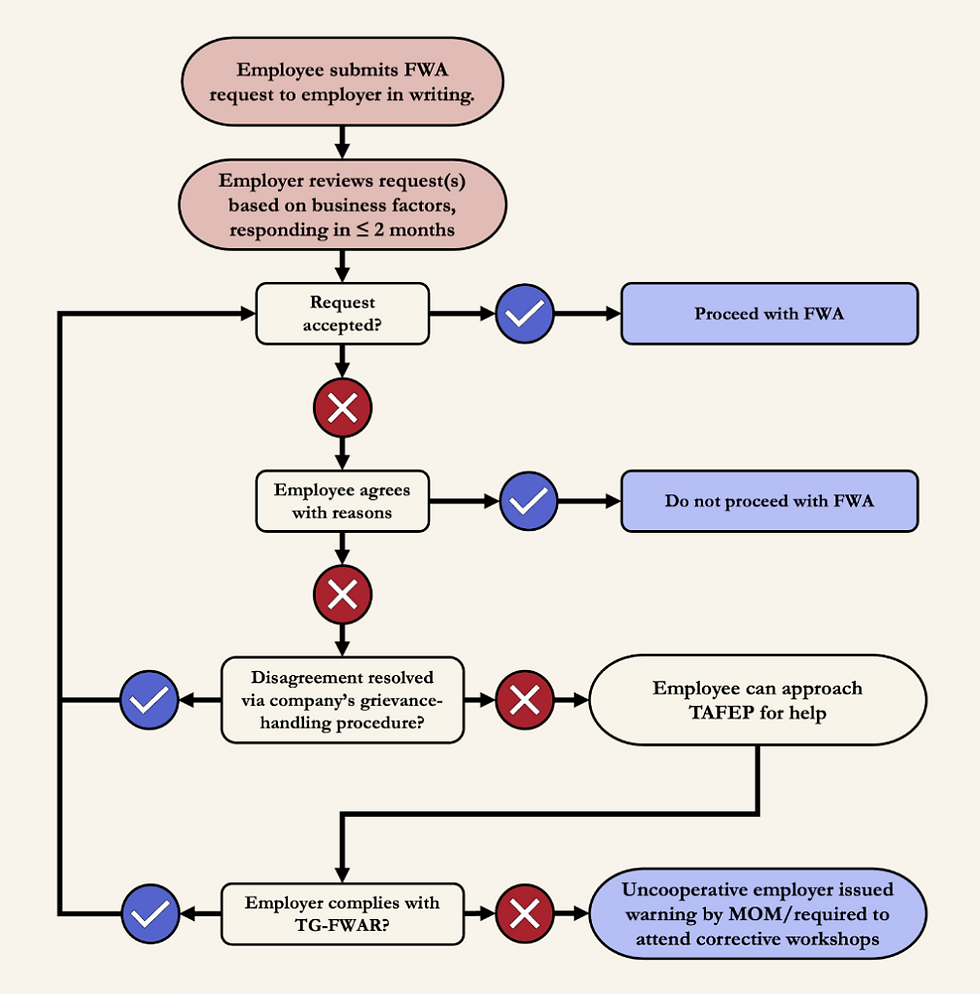
In this Explainer, find out...
What are the Tripartite Guidelines on Flexible Work Arrangement Requests?
How receptive are Singaporean businesses and workers to flexible work arrangements?
What lessons can Singapore learn from flexible work arrangement abroad?
Introduction
Catalysed by the Covid-19 pandemic, flexible work arrangements (FWAs) have become increasingly common in Singapore. Ranging from a four-day work week to the option to work-from-home, FWAs have been generally well-received in Singapore for a variety of reasons. In fact, 73 per cent of Singaporeans prefer the hybrid work model offered by FWAs.¹
Given the popularity and recency of this phenomenon, it is worth investigating the pros and cons of FWAs, as well as the lessons Singapore can glean from other countries who have adopted FWAs.
What is Tripartism?
Before delving into the Tripartite Guidelines on Flexible Work Arrangement Requests (TG-FWAR), it is important to understand what tripartism looks like in Singapore. Singapore’s tripartite alliance comprises three groups:
Workers, represented by the National Trades Union Congress (NTUC);
Employers, represented by the Singapore National Employers Federation (SNEF); and
The Government, represented by the Ministry of Manpower (MOM).²
This unique partnership is a cornerstone of Singapore’s economic competitiveness. Firstly, tripartism preserves social stability by enabling the negotiation of interests in a “non-confrontational and objective manner”.³ This creates a stable and therefore attractive environment for investors, whose investments in turn create more job opportunities.⁴ One landmark agreement arising from tripartism in Singapore is the Progressive Wage Model, which raises the wages of lower-income earners through upskilling.⁵
Secondly, tripartism facilitates the creation of policies that enhance productivity. This is achieved through consultation and negotiation, for instance, on matters relating to building a skilled and inclusive workforce. To this end, economic objectives can be better aligned and achieved more quickly.⁶
Tripartite Guidelines on Flexible Work Arrangement Requests
How important are FWAs to employees in Singapore? As it turns out, a significant proportion of the workforce values FWAs highly. Four in 10 employees are even willing to give up higher pay in exchange for remote working.⁷
However, there is a mismatch in expectations: while 83 per cent of employers in Singapore believe their workplaces offer FWAs, only 61 per cent of employees share this view.⁸ Therefore, clear and comprehensive guidelines are necessary to streamline procedures and align expectations around FWAs.
Overview of the TG-FWAR
The TG-FWAR, launched on 1 December 2024,⁹ establishes norms and guidelines for requesting and handling FWAs. In doing so, it seeks to create “fair, progressive, and responsible” workplaces in Singapore.¹⁰
Under the guidelines, employers must consider three broadly defined categories of FWAs fairly:
Flexi-place: where employees can choose to work from different locations other than their usual office location;
Flexi-time: where employees can choose to work at alternative timings without changes to total work hours and workload; and
Flexi-load: where employees take up different workloads with a commensurate wage.¹¹
Figure 1 summarises the process for handling FWA requests.

How Employees Should Request FWAs
Importantly, the TG-FWAR only covers formal requests made in writing and those involving structured and recurring arrangements.¹³ Applicants should indicate the expected frequency and duration of FWAs and justify their need. If the request is rejected and a mutual agreement cannot be reached, employees should first try to resolve disagreements using the company’s internal grievance-handling mechanism. If this fails, employees may then approach their own unions or the Tripartite Alliance for Fair and Progressive Employment Practices (TAFEP).¹⁴
How Employers Should Handle FWAs
The TG-FWAR stipulates that all employers must implement a process for managing formal FWA requests and respond to requests within two months. Employers are also expected to make decisions based on reasonable business grounds. For example, a FWA may be rejected due to a substantial impact on cost or productivity, but not for non-business factors such as cynicism over the need for FWAs.¹⁵ Employers who reject FWA requests on unfair grounds may be issued a warning by MOM and required to attend corrective workshops.¹⁶
Benefits and Challenges of FWAs
FWAs have several benefits such as fostering inclusive workplaces and improving work-life balance. On the flipside, there are also challenges, such as concerns about reduced productivity and cultural stigma surrounding FWAs.
More Inclusive Workplaces
Adopting FWAs foster a more inclusive workplace by accommodating the diverse needs of employees. For one, employees should be able to balance work and family without sacrificing one for the other. For some, the focus on careers in Singapore have led them to delay starting a family.¹⁷ Meanwhile, others torn between family obligations and work have been driven to leave the workforce entirely.¹⁸ Mums@Work hosts around 68,000 mothers looking for FWAs, suggesting the importance of FWAs for many.
Further, 80 per cent of mothers at Mums@Work have at least eight years of working experience.¹⁹ Thus, making FWAs more accessible will not only help women stay engaged in their careers while managing the physical and emotional fatigue of their family responsibilities, but it will also unlock productivity gains for businesses and the economy.
Looking beyond women, seniors constituted 27 per cent of Singapore’s workforce in 2022.²⁰ This is likely to increase as the Government raises the retirement and re-employment ages to 64 and 69 respectively in 2026.²¹ Older employees may find it challenging to endure long hours, especially in jobs that keep them on their feet, like in the food and beverage industry.²² They are thus more likely to welcome FWAs.
Finally, as Singapore’s population ages, more working adults are expected to become caregivers.²³ In this vein, receptiveness to FWAs has grown as caregivers welcome the increase in time and energy made available by FWAs for them to look after their loved ones.²⁴
Overall, by helping these stakeholders manage work alongside their own needs and responsibilities, FWAs can help with labour retention and maximising Singapore’s productivity.
Work to Live, not Live to Work
FWAs may also bring a much-needed improvement to work-life balance in Singapore. Two-thirds of workers in Singapore reported themselves feeling burnt out in 2024.²⁵ This can be ameliorated by FWAs involving remote work, with the latter being found to be correlated with lower stress levels.²⁶ This logic is intuitive — just imagine having one more hour of sleep instead of catching rush hour traffic! FWAs can reduce the stress associated with rigid work schedules and long commutes, allowing employees to balance between family, personal interests, and self-care more easily.
Employers’ Cost Concerns
Many firms — particularly small and medium enterprises (SMEs) which employ 71% of Singapore’s workforce — are facing rising cost concerns.²⁷ Can these firms afford to offer flexible work? Their limited budget arguably constrains their ability to invest in tools needed to facilitate FWAs, such as virtual private networks to protect company data while working remotely.²⁸ SMEs can consider tapping on grants such as Enterprise Singapore’s Enterprise Development Grant (EDG) which covers 50 per cent of eligible costs for growing the company.²⁹ Furthermore, offering FWAs might also enhance competitiveness in a tight job market. As FWAs are highly valued, these firms can become more attractive to top talent.³⁰
Stigma Surrounding FWAs
Employees may be hesitant to submit FWA requests due to concerns that it could reflect poorly on their professionalism and dampen their career prospects. These concerns are not unfounded: 20 per cent of individuals with FWAs in the United Kingdom report experiencing lower salaries or setbacks in career advancement. This stems from a perception that they contribute less to the company.³¹
Even more worryingly, gender stereotypes may be reinforced, with men working longer hours and women taking on more caregiving responsibilities. Studies show that employers tend to expect women to use flexible working for family needs, and expect men to prioritise work hours for career growth.³² This also suggests that working mothers requesting for FWAs may suffer more stigma due to assumptions that they will prioritise family over work and thus become less committed to the company.³³
While the TG-FWAR may help to shape public sentiment, it may not necessarily inspire an overnight shift in the mindsets of all business owners. Nevertheless, this move encourages necessary dialogue between employers and employees, which might otherwise not occur at all due to the power imbalance.³⁴
Can We Have a Four-Day Work Week?
The four-day work week is one out of many types of FWAs. A 2024 survey indicated that one in five employees in Singapore already work in companies offering four-day work weeks.³⁵ Is mandating a four-day work week viable in Singapore?
It is worth noting that before 2004, a five-and-a-half day work week was the norm in Singapore. Similar to 2004, a shift towards a four-day work week would require the Government to be a first-mover. Back then, companies were unwilling to initiate the shift to a five-day work week, although most were favourable to the change in the long run.
However, while Singaporean employees are receptive to four-day work weeks, employer concerns might slow their adoption. Some employers believe that a four-day work week will not lower business costs by much, if at all.³⁶ Others believe that employee productivity will decline due to the additional day of rest.³⁷
How Are Others Faring?
As the four-day work week becomes increasingly popular, how should employer concerns be alleviated? How have countries with a four-day work week addressed them? Singapore, Japan and Iceland share several similarities, including cultural ones and the share of working hours, thus offering more relevant case studies to refer to.
Japan: Preventing Burnout
Japan’s infamous gruelling long hours were acknowledged in the country’s trial of a four-day work week. To prevent karoshi, which translates to “death by overwork”, employees are given the option of longer workdays in exchange for a weekday off and lower pays.³⁸ Microsoft Japan’s trial of the four-day work week has yielded some initial success. The company claimed that productivity increased by 40 per cent, while electricity costs fell by 23 per cent. ³⁹
Iceland: Promoting Well-being
In comparison to Japan’s trial of the four-day work week, Iceland’s trial involves reducing the total work hours without a commensurate pay cut.⁴⁰ As of 2021, 86 per cent of the population have reduced work hours or accommodation.⁴¹ This has led to an increase in well-being with minimal declines in productivity. As such, employers can enjoy lower operating costs while employees benefit from improved well-being. Iceland’s experience with the four-day work week offers insights for Singapore as the Government makes mental health a national priority.⁴²
Conclusion
Beginning with the COVID-19 pandemic, an increasing number of Singaporeans have come to experience the benefits of FWAs. With clearer guidelines surrounding FWAs, even more Singaporeans stand to benefit from better work-life balance and a more inclusive workplace. However, further refinement is necessary to address the stigma and concerns surrounding FWAs.
By extension, the notion of a four-day work week is extremely appealing. Many countries like Japan and Iceland have trialled a four-day work week with some success. Singapore can refer to these experiments and the lessons learnt from our counterparts as we move towards a future of flex-and-thrive.
This Policy Explainer was written by members of MAJU. MAJU is an independent, youth-led organisation that focuses on engaging Singaporean youths in a long-term research process to guide them in jointly formulating policy ideas of their own.
By sharing our unique youth perspectives, MAJU hopes to contribute to the policymaking discourse and future of Singapore.
.png)
Comments